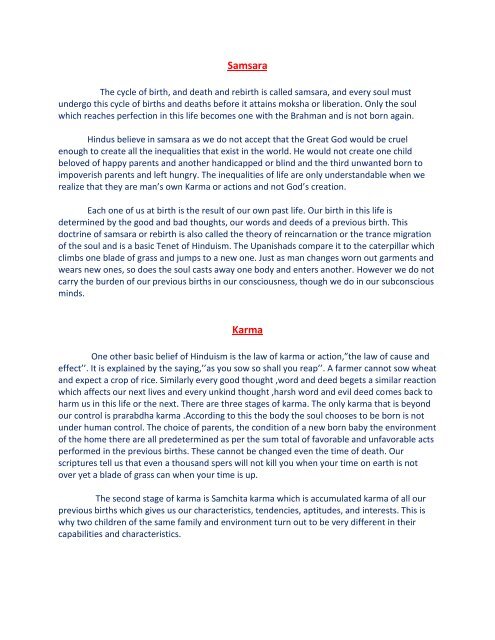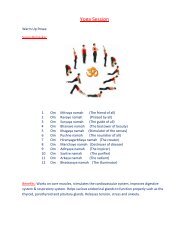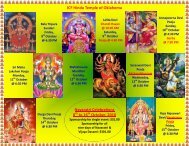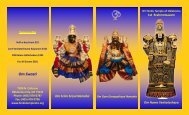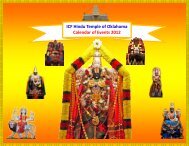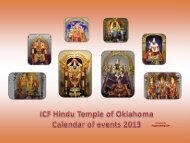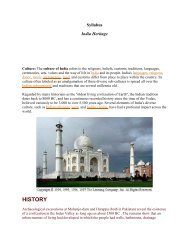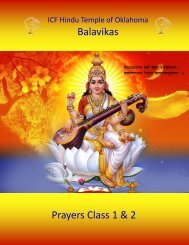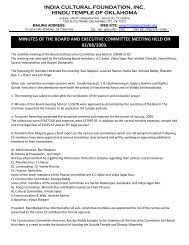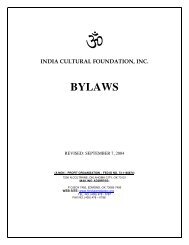Balavikas - Hindu Temple of Oklahoma City
Balavikas - Hindu Temple of Oklahoma City
Balavikas - Hindu Temple of Oklahoma City
You also want an ePaper? Increase the reach of your titles
YUMPU automatically turns print PDFs into web optimized ePapers that Google loves.
Samsara<br />
The cycle <strong>of</strong> birth, and death and rebirth is called samsara, and every soul must<br />
undergo this cycle <strong>of</strong> births and deaths before it attains moksha or liberation. Only the soul<br />
which reaches perfection in this life becomes one with the Brahman and is not born again.<br />
<strong>Hindu</strong>s believe in samsara as we do not accept that the Great God would be cruel<br />
enough to create all the inequalities that exist in the world. He would not create one child<br />
beloved <strong>of</strong> happy parents and another handicapped or blind and the third unwanted born to<br />
impoverish parents and left hungry. The inequalities <strong>of</strong> life are only understandable when we<br />
realize that they are man’s own Karma or actions and not God’s creation.<br />
Each one <strong>of</strong> us at birth is the result <strong>of</strong> our own past life. Our birth in this life is<br />
determined by the good and bad thoughts, our words and deeds <strong>of</strong> a previous birth. This<br />
doctrine <strong>of</strong> samsara or rebirth is also called the theory <strong>of</strong> reincarnation or the trance migration<br />
<strong>of</strong> the soul and is a basic Tenet <strong>of</strong> <strong>Hindu</strong>ism. The Upanishads compare it to the caterpillar which<br />
climbs one blade <strong>of</strong> grass and jumps to a new one. Just as man changes worn out garments and<br />
wears new ones, so does the soul casts away one body and enters another. However we do not<br />
carry the burden <strong>of</strong> our previous births in our consciousness, though we do in our subconscious<br />
minds.<br />
Karma<br />
One other basic belief <strong>of</strong> <strong>Hindu</strong>ism is the law <strong>of</strong> karma or action,”the law <strong>of</strong> cause and<br />
effect’’. It is explained by the saying,’’as you sow so shall you reap’’. A farmer cannot sow wheat<br />
and expect a crop <strong>of</strong> rice. Similarly every good thought ,word and deed begets a similar reaction<br />
which affects our next lives and every unkind thought ,harsh word and evil deed comes back to<br />
harm us in this life or the next. There are three stages <strong>of</strong> karma. The only karma that is beyond<br />
our control is prarabdha karma .According to this the body the soul chooses to be born is not<br />
under human control. The choice <strong>of</strong> parents, the condition <strong>of</strong> a new born baby the environment<br />
<strong>of</strong> the home there are all predetermined as per the sum total <strong>of</strong> favorable and unfavorable acts<br />
performed in the previous births. These cannot be changed even the time <strong>of</strong> death. Our<br />
scriptures tell us that even a thousand spers will not kill you when your time on earth is not<br />
over yet a blade <strong>of</strong> grass can when your time is up.<br />
The second stage <strong>of</strong> karma is Samchita karma which is accumulated karma <strong>of</strong> all our<br />
previous births which gives us our characteristics, tendencies, aptitudes, and interests. This is<br />
why two children <strong>of</strong> the same family and environment turn out to be very different in their<br />
capabilities and characteristics.


